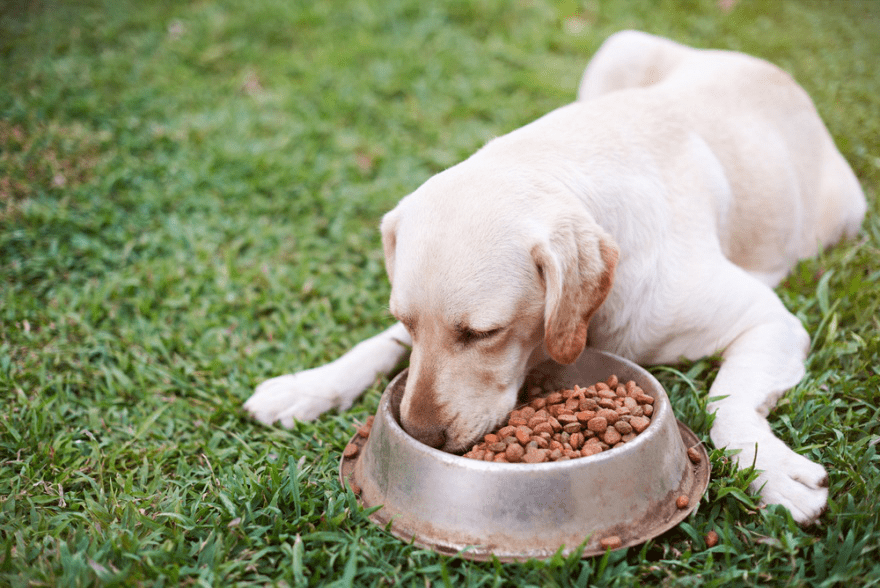Finding the best dog food for your pup is important no matter its breed or even if it’s a mixed breed. It’s also important, though, to take your dog’s specific breed into account when choosing the right food. Different breeds have different dietary needs and choosing the wrong type of food can not only affect how your dog feels on a daily basis but can also affect the long-term health of your puppy.

The best type of food for your Labrador retriever should be a safe option that is Association of American Feed Control Officials (AAFCO) compliant and that is made with high-quality ingredients. The primary ingredient in dog food for any type of breed should be meat and there should be no filler ingredients.
All that said, it’s also important to choose a food that your dog likes and will willingly eat and one that you can afford. After all, the best foods won’t do you any good if you can’t afford to buy it for your puppy.
Common health problems include:
- Allergies (especially Food allergies)
- Hip dysplasia
- Weight gain
There are also some specific things to take into account when you’re shopping for food for your pet, whether it’s a Lab or not. Your dog’s age, weight, activity level, allergies, and overall health are all important. Your dog’s nutritional needs will change throughout its life, so make sure you are taking into account what is going on with your dog at any given time when choosing a food.
High-Quality Dog Food for Labrador Retrievers
All major dog food companies in the United States are required to meet certain standards when creating their products. These requirements are established by the AAFCO and ensure that the food is safe and effective for meeting the nutritional needs of dogs in general. You should never give your dog food that has not been evaluated by the AAFCO and determined to meet its standards.

Another important consideration when choosing dog food relates to so-called filler ingredients. The primary ingredient in any high-quality dog food should be animal protein. This can be beef, chicken, lamb, bison, fish, turkey, etc., but must be from an animal. The protein can and should be mixed with other ingredients, but those should be things that provide nutritional value to your dog. Many dog food companies blend animal protein with vegetables and fruits to give your dog a well-rounded meal.
Dog food companies that substitute vegetable proteins for animal proteins as the primary ingredient are selling foods that lack the amino acids your pet needs to remain healthy and should not be considered high-quality foods. You’ll know the primary ingredient because it will be listed first on the ingredients list. The first few ingredients on the list make up the bulk of that particular food, so you’ll want to choose a food that has animal protein and other high-nutrient foods appropriate for dogs in the first few ingredients.
The bottom line? Dog’s need meat.
It’s also a good idea to figure out how much food your Lab needs so you can budget for the food you’ll need to purchase. What someone can afford to feed a smaller breed might not be an option for a Lab owner who is feeding a bigger dog.
There are food calculators available online that help you determine how many calories your Lab needs each day based on its weight, age, and activity level. Most dog food brands also offer a recommendation for how much of their product to feed but keep in mind this isn’t dog specific. You can also ask your veterinarian for a recommendation for daily caloric intake for your dog. After all, feeding your dog the right way is essential.
Our Top Three Picks for Best Foods for Labrador Retrievers
Whether you are looking for the latest grain-free diet with natural ingredients, raw food with all nutritional requirements, breed-specific dog food, puppy food, standard pet food, or some other high-quality dog food, just what dog food for Labrador Retrievers is best to ensure a well-balanced diet? Let’s take a look at our best dog food reviews that will ensure the health and well-being of your Lab puppy.
Stellas Chewy Chicken
Stella & Chewy’s is a raw dog food brand that offers both frozen and freeze-dried options. We prefer the freeze-dried option because it gives your dog more flexibility for when it will eat without food spoiling, but this isn’t usually an issue for Labs who tend to gobble down their food. You can feed dry or add water to rehydrate the food.
Stella in Chewy’s patties come in several different flavors and combine a blend of animal protein, vegetables, fruits, and other ingredients.
Benefits of Stella & Chewy’s
- Made with animals that are raised without hormones or antibiotics and 100% organic-certified fruits and vegetables
- Formulated to mimic a dog’s natural diet
- Free of grains, gluten, fillers, artificial preservatives, and colorings
- Complete and balanced nutrition with added probiotics to aid in healthy digestion
- Proudly made in the USA, responsibly-sourced ingredients from trusted and reputable suppliers
Drawbacks
- Raw feeding has its advantages, but it can be a tough transition if your dog hasn’t been eating raw. Follow food adjustment guidelines if you plan to switch your dog from cooked to raw food.
- Stella & Chewy’s products should never be cooked or heated, nor should you combine the freeze-dried food with hot water if you are rehydrating.
Zignature Trout & Salmon Meal Limited
Zignature brand foods markets itself ad “meat-first” and limits the total number of ingredients in the food. The Trout & Salmon Meal Limited Ingredient Formula Grain-Free Dry Dog Food includes no problematic ingredients that tend to trigger allergies like soy, chicken and corn, wheat, and soy.
Benefits of Zignature
- Contains a single protein source and a few other ingredients
- Fish sourced from the Northwestern USA
- High in omega-3 Fatty Acids, B12, Niacin, B6, Phosphorus, and Selenium
- Non-meat ingredients include peas and chickpeas
Drawbacks
- There are mixed opinions on feeding dogs grain-free foods. You should discuss your options with your veterinarian to ensure your dog is getting the proper nutrition it needs.
Iams Proactive Dry Dog Food
Iams offers a seemingly endless variety of foods which includes options that are breed specific. This option designed for large breed adult dogs is a popular option for labs. This is dry kibble, which means you get a simple, no-mess feeding option that most dogs enjoy.
Benefits
- Designed to meet the nutritional needs of Labrador Retrievers
- Custom-blend of wholesome fiber and natural prebiotics to help with digestion
- Contains no soy, wheat, or fillers
Drawbacks
- There are mixed opinions on feeding kibble, but many dog owners find that as long as they choose kibble with high-quality ingredients and ensure their dog is drinking plenty of water, their dogs do just fine with it.
Conclusion
Feeding your Lab doesn’t need to be challenging. Most aren’t picky eaters and are more than happy to gobble down whatever you give them. Make sure you are providing them with high-quality food that meets their nutritional needs and supports a long, happy, and healthy life.


